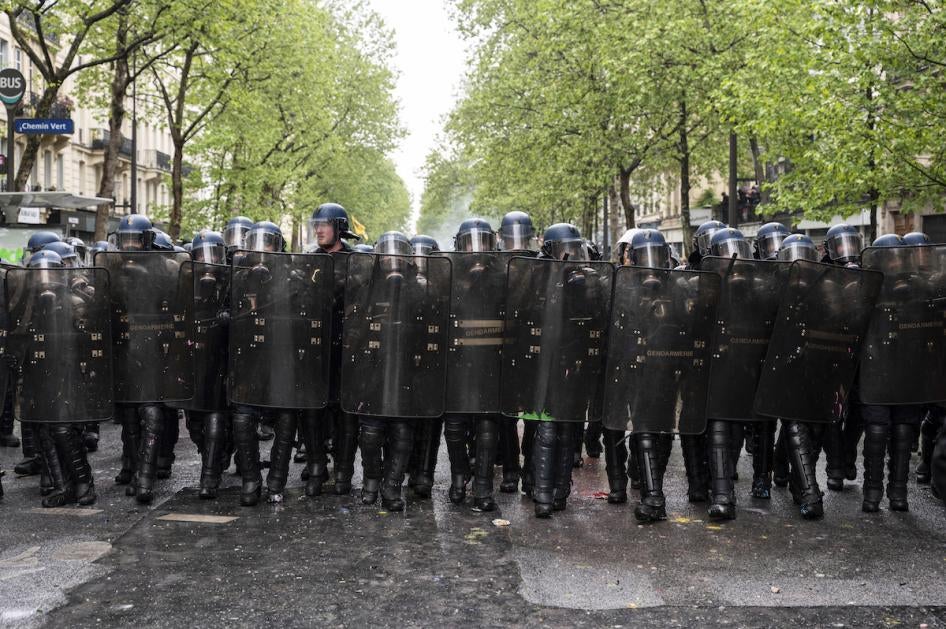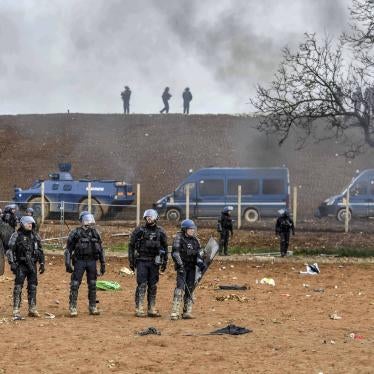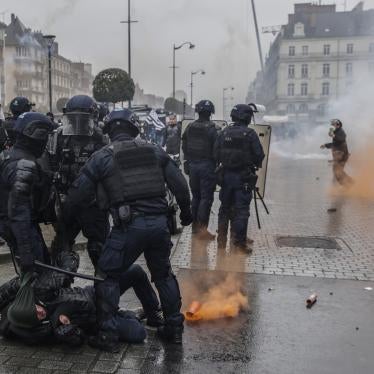By Bénédicte Jeannerod and Jean-Claude Samouiller
For several years, we have been alerting the French government on the need to protect freedom of association and to ensure a safe and supportive environment for individuals, groups and civil society organizations that peacefully mobilize for human rights.
We have denounced restrictions on the right to protest in France, as well as policing practices and policies that result in excessive use of force, misuse of dangerous weapons, and the abusive arrests documented by numerous rights organizations. We have also expressed serious concerns about laws that threaten certain fundamental freedoms. In addition, government officials have openly attacked the work of rights organizations.
We are alarmed by these restrictions on civic space in France that compromise the protection of rights. And we wonder whether it is still possible to criticize the French government's policies without fear of sanctions or reprisals.
Human rights cannot be protected without a safe and open space for civil society, where the rights to freedom of expression, assembly, and association are guaranteed without undue control and interference by the state. Fundamental freedoms are a pillar of the rule of law and are protected by international law. In a democracy, civil society organizations have an essential function in criticizing the executive branch. Yet this space is dangerously shrinking in France, especially when it comes to defending specific groups or causes.
Based on statements by successive government officials under the presidency of Emmanuel Macron, helping migrants and refugees in Calais, on the French-Italian border, or in the Mediterranean would be “playing into the hands of smugglers.” Fighting discrimination against Muslims in France would be “Islamist propaganda.” Denouncing the excesses of French policing policy would inflame social tensions and would be “intellectual terrorism.”
The recent comments of the interior minister questioning public funding to the League for Human Rights for its criticism of abusive police practices during recent demonstrations is another disturbing challenge to the indispensable work of independent rights organizations.
Such rhetoric by government officials denigrating and stigmatizing rights groups is intended to delegitimize the causes for which they mobilize and is detrimental to the people whose voices they defend.
Measures that undermine freedom of association have also been adopted in parallel. For example, the law “consolidating respect for the principles of the Republic,” known as the separatism law, has broadened the grounds for dissolving associations and facilitates the withdrawal of public subsidies. French civil society needs space to provide assistance to vulnerable people as well as to alert, denounce, or criticize the policies and actions of the government or of some of its agents without paying a price for speaking out.
It is the responsibility of the president and the government to protect this space and these freedoms, to guarantee to each and every person the right to peacefully express their opinions and demands, including on the streets. However, for several years now, we have seen a brutal policing strategy that increasingly restricts the right to peaceful assembly.
Countless accounts and images circulating on social media or disseminated by the mainstream media suggest that law enforcement officers have resorted to a seemingly excessive, disproportionate, and indiscriminate response during recent demonstrations in France. This is not new: during the Yellow Vests movement, at least 2,500 protesters were injured, and dozens were grazed or maimed by rubber ball launchers or grenade fire, according to the independent journalist David Dufresne's count. Frightened by the multiple accounts of people who have been subjected to these brutal methods, many people give up going to demonstrations or expressing their opinions.
The serious drift of policing over the past several years has been denounced by major human rights organizations, the French Human Rights Defender, the National Consultative Commission on Human Rights (CNCDH), as well as by the United Nations and the Council of Europe. Yet President Emmanuel Macron and his government continue to deny these findings and fail to take the necessary measures to prevent these abuses.
The goals of justice, dignity and equality can only be achieved when individuals and associations have the opportunity and space to organize, advocate and act on behalf of human rights.
Instead of stigmatizing, sanctioning, criminalizing, or repressing those who defend human rights or peacefully exercise their right to demonstrate, we urge the president and the government to do everything possible to protect the freedoms of association and demonstration and civic space in France: these are essential conditions for the protection of the rights of all and the vitality of democracy.
Benedicte Jeannerod is France director at Human Rights Watch and Jean-Claude Samouiller is the President of Amnesty International France.









